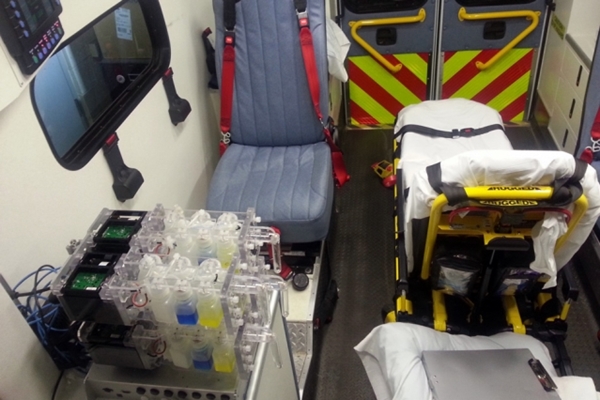29 July 2016. A portable device that produces small batches of biological drugs, down to a single dose, was shown to generate two different biopharmaceuticals under lab conditions. A description of the system and results of the proof-of-concept test appear in today’s issue of the journal Nature Communications.
The team from the Synthetic Biology group led by bioengineering professor Timothy Lu and affiliated labs at Massachusetts Institute of Technology is seeking techniques for producing drugs from biological processes, such as vaccines and protein treatments. With current technology, biopharmaceuticals require long lead times and must be produced in large batches, making it difficult to serve people in remote locations, emergency conditions, or soldiers on the battlefield. In fact, Defense Advanced Research Projects Agency or DARPA, an agency with a direct interest in this capability, provided funding for the project.
Lu and colleagues designed their device to be an integrated, stand-alone system that could be easily transported and deployed, and produce a range of different biological drugs. Their system is a millimeter-scale bioreactor, measuring 31 x 34 x 36 centimeters, that can be programmed to produce therapeutic proteins on demand to meet certain criteria. The bioreactor contains Pichia pastoris, a strain of yeast that grows quickly and easily. This yeast species grows with ordinary methanol, an inexpensive alcohol, as its energy source, and in high cellular densities.
A key component of the bioreactor is a microfluidic or lab-on-a-chip device with channels, membranes, and chambers for mixing and storing cells and fluids, then pumping out the product. The microfluidic device is a product of the optics and electronic lab led by MIT engineering professor Rajeev Ram, a co-senior author of the paper. The device is also being commercialized by a Pharyx Inc. in Woburn, Massachusetts, a start-up company founded by Kevin Lee, another co-author.
MIT team genetically engineered the yeast for a raw material that could produce different kinds of biologic drugs, which for the proof-of-concept paper were recombinant human growth hormone, a treatment for growth disorders in children, and interferon alpha-2b, an anti-viral protein also approved as a cancer treatment. Each of the engineered yeast varieties was then exposed to a triggering compound:
– Beta-estradiol, a form of estrogen, to produce recombinant human growth hormone, and
– Methanol, to produce interferon alpha-2b
In each case, the bioreactor succeeded in producing near single-dose quantities of the desired biologic drugs in less than 24 hours. As important, the bioreactor was designed to flush out the product, leaving the engineered yeast cells for producing the proteins, which allows the same system for generating multiple drugs. In a real-life setting, output from the bioreactor would still need analysis and purification before the product could be used as a treatment.
Lu and colleagues are investigating enhancements to the system for generating combinations of antibodies used together, which could affect the often high price of these biologic drugs, since they usually require separate production lines. “But if you could engineer a single strain, or maybe even a consortia of strains that grow together, to manufacture combinations of biologics or antibodies,” says Lu in a university statement, “that could be a very powerful way of producing these drugs at a reasonable cost.”
Read more:
- Common Antibodies Found for Multi-Virus Flu Vaccine
- RNA Technology Allows for Fast Vaccine Development
- Bacterial-Biopolymer Delivery System Designed for Vaccines
- Protein Biotech Lands $51.5M in First Venture Round
- Moderna, Merck Partner on Personal Cancer Vaccines
* * *


 RSS - Posts
RSS - Posts
You must be logged in to post a comment.